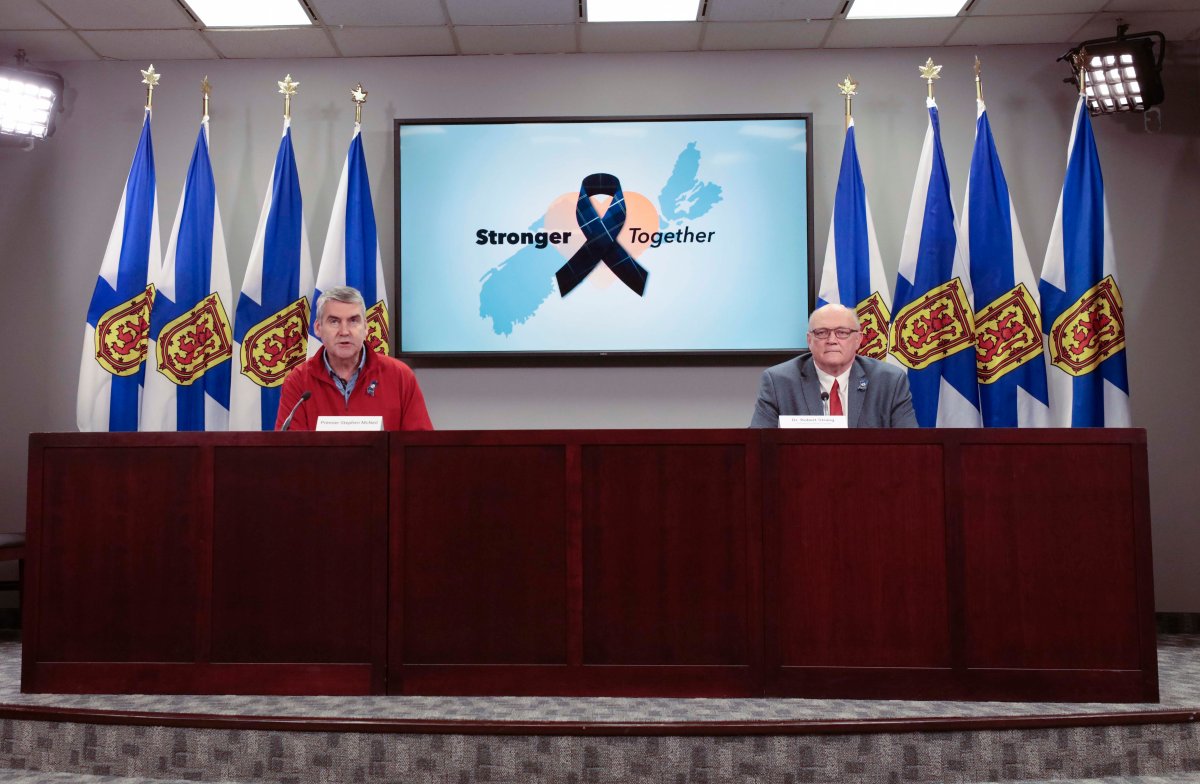Despite the 27 new cases of the novel coronavirus the province announced on Monday, Nova Scotia has seen a decrease in active cases and no new reported deaths.

There are now a total of 900 COVID-19 cases in Nova Scotia, 367 of which remain active. There were 410 active cases on Sunday.
There are now a total of 509 people who have recovered from COVID-19 in the province.
Here is a breakdown of where COVID-19 cases have been identified in Nova Scotia by health zone:
- Central: 757
- Western: 54
- Eastern: 50
- Northern: 39
On Sunday, the province reported eight new cases and its 24th death.
There are now 12 patients in hospital, three of which in an intensive care unit. There were 13 in hospital on Sunday.
Sixty-one per cent of the cases involve female patients while 39 per cent are male.
- Canadian man dies during Texas Ironman event. His widow wants answers as to why
- ‘Sciatica was gone’: hospital performs robot-assisted spinal surgery in Canadian first
- Canadians more likely to eat food past best-before date. What are the risks?
- Treatment from female doctors leads to lower death rates, study finds
The age group most impacted by COVID-19 in Nova Scotia is those between 40 and 59.

The QEII Health Sciences Centre’s microbiology lab completed 645 Nova Scotia tests on Sunday.
“Aggressive and accessible testing remains a critical part of Nova Scotia’s fight against COVID-19. We need to identify and treat as many cases as we can,” said Dr. Robert Strang, Nova Scotia’s chief medical officer of health.
“If you have two of these symptoms — fever, new or worsening cough, sore throat, runny nose or headache — please visit the 811 website. If you do not have internet access then please call 811.”
1 more case at Northwood
As of Sunday, there were 10 licensed long-term care homes and unlicensed seniors’ facilities in Nova Scotia with cases of COVID-19, involving 198 residents and 95 staff. That’s an increase of one from Sunday.
Northwood Manor, which is experiencing an outbreak in COVID-19 cases, announced Monday the one case came from its facility.
There are now a total of 250 cases at the long-term care home and 18 deaths. Seven residents are now at the facility’s off-site recovery unit, bringing the total residents at the unit to seven.
“We will get through this extraordinarily difficult time by pulling together and supporting each another,” Premier Stephen McNeil said in a statement. “Please continue to reach out to your loved ones, be there for those who are grieving or having a difficult time and know that we will come through this.”
The number of staff at Northwood who have tested positive remains at 71.
Here are is a breakdown of how many Nova Scotia Health Authority employees have tested positive:
- Eastern: 6 (3 have recovered and have returned to work)
- Northern: 1 (Employee has recovered and returned to work)
- Central: 16 (10 have recovered and have returned to work)
- Western: 1
Nova Scotia will not be holding a COVID-19 press briefing on Monday.
Questions about COVID-19? Here are some things you need to know:
Health officials caution against all international travel. Returning travellers are legally obligated to self-isolate for 14 days, beginning March 26, in case they develop symptoms and to prevent spreading the virus to others. Some provinces and territories have also implemented additional recommendations or enforcement measures to ensure those returning to the area self-isolate.
Symptoms can include fever, cough and difficulty breathing — very similar to a cold or flu. Some people can develop a more severe illness. People most at risk of this include older adults and people with severe chronic medical conditions like heart, lung or kidney disease. If you develop symptoms, contact public health authorities.
To prevent the virus from spreading, experts recommend frequent handwashing and coughing into your sleeve. They also recommend minimizing contact with others, staying home as much as possible and maintaining a distance of two metres from other people if you go out.
For full COVID-19 coverage from Global News, click here.






Comments